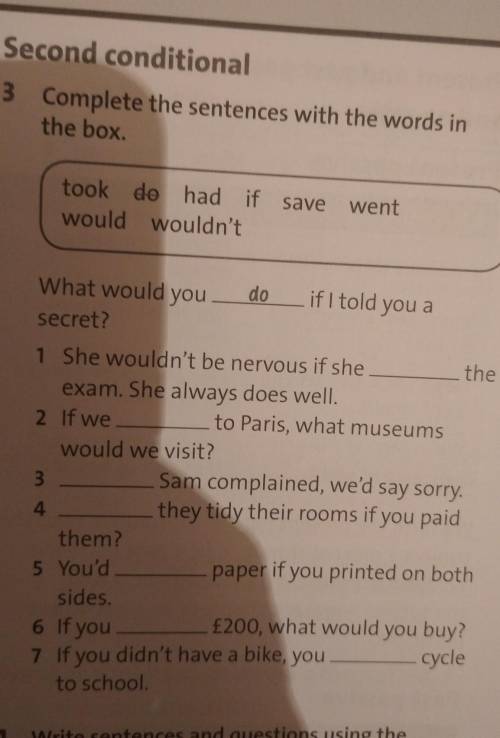3 Complete the sentences with the words in the box.
took de had if save went
would wouldn't
if I told you a
What would you
do
secret?
1 She wouldn't be nervous if she
the
exam. She always does well.
2 If we
to Paris, what museums
would we visit?
3
Sam complained, we'd say sorry.
4
they tidy their rooms if you paid
them?
5 You'd
paper if you printed on both
sides.
6 If you
£200, what would you buy?
7 If you didn't have a bike, you cycle
to school.

Другие вопросы по теме Английский язык
Популярные вопросы
- Из мосвы в тулу выехал автобус с пассажирами. часом позже из тулы в москву...
3 - 17 первоклассников каждый с двумя родителями и учителем собрались на пикник...
2 - По первому признаку подобия треугольников (если два угла одного треугольника...
1 - Назовите архитектурные памятники периода реализма!...
3 - 1. при каких х векторы а(6; -3) и в(х; 4) образуют острый угол. 2. стороны...
2 - Вгороде за год должны построить 15000 квартир. за два месяца строители сдали...
3 - Выдели приставки . подчеркни предлоги . уехали отец с матерью в город .машенька...
2 - Обьясните как это решать x÷30=60×5 4 класс...
1 - Тихую,месячную ночь мы отправились на рыбную ловлю. жаркое солнце смотрело...
1 - Начерти прямоугольник длина которого 9см а ширина состовляет 1/3 длины. вычисли...
1
In this sentence, we are discussing the possibility of someone being nervous during an exam. The word "wouldn't" is used to express the hypothetical situation of the person not being nervous. The word "took" is used to indicate that the person actually attempted the exam. The reason for the person not being nervous is stated as them consistently performing well in exams.
2 If we went to Paris, what museums would we visit?
In this sentence, we are talking about a hypothetical situation where we are in Paris. The word "went" is used to suggest the possibility of going to Paris. The word "would" is used to express the hypothetical situation of visiting museums. We are asking the listener to consider which museums they would choose to visit if they were in Paris.
3 If Sam complained, we'd say sorry.
In this sentence, we are discussing the reaction to Sam's complaint. The word "complained" suggests that Sam expressed dissatisfaction or discontent. The phrase "we'd say sorry" indicates that if Sam indeed complained, we would apologize in response. The word "if" is used to introduce the condition of Sam complaining.
4 Would they tidy their rooms if you paid them?
In this sentence, we are discussing the willingness of a group of people to tidy their rooms. The word "would" is used to express the hypothetical situation of them tidying their rooms. The phrase "if you paid them" introduces the condition on whether they would be willing to tidy their rooms. The word "if" indicates that their decision is dependent on being paid.
5 You'd save paper if you printed on both sides.
In this sentence, we are discussing the conservation of paper. The word "would" is used to express the hypothetical situation of saving paper. The word "printed" indicates the action of using a printer. The phrase "on both sides" suggests that printing on both sides of a paper would contribute to saving paper. The word "if" introduces the condition of printing on both sides.
6 If you had £200, what would you buy?
In this sentence, we are discussing the potential purchase choices of a person with a certain amount of money. The phrase "If you had £200" suggests possessing a specific amount. The word "would" is used to express the hypothetical situation of making a purchase. We are asking the listener to consider what they would buy if they had £200.
7 If you didn't have a bike, would you cycle to school?
In this sentence, we are discussing the mode of transportation to school. The phrase "didn't have" suggests the absence of bike ownership. The word "would" is used to express the hypothetical situation of cycling to school. The word "if" introduces the condition of not having a bike.
In conclusion, the use of words such as "would" and "if" in these sentences indicates hypothetical situations and conditions. The context and meaning of each sentence are explained by analyzing the verbs and phrases surrounding these words.